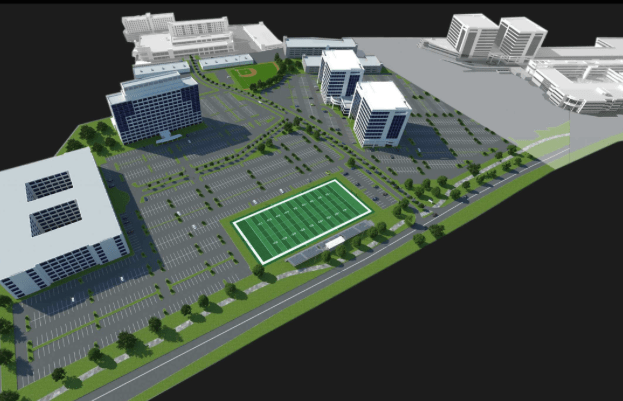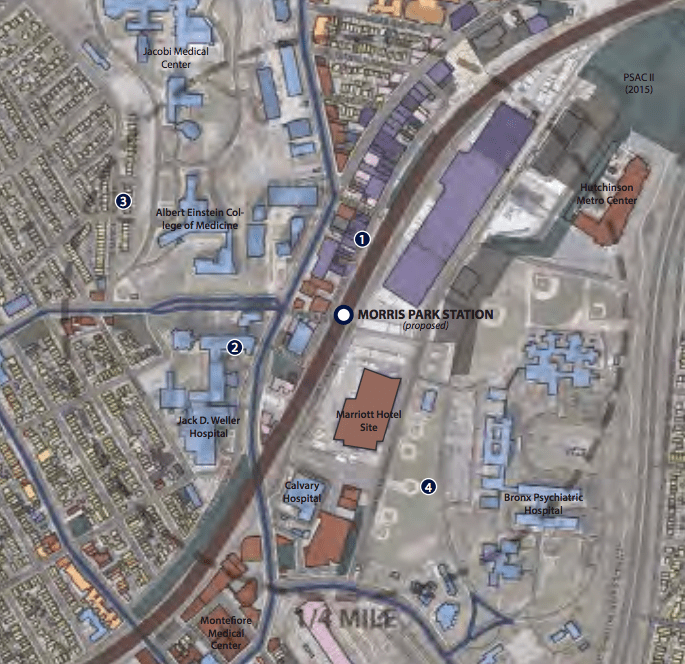
The East Bronx is on track to get new Metro-North service, but developers are building unwalkable, traffic-generating projects near the stations, fueled by state and city funding for highway ramps and expansions. Unless things change, the new rail service will be marooned in a sea of car-centric sprawl and traffic congestion.
The biggest development site, sandwiched between an Amtrak line and the Hutchinson River Parkway, is just east of Jacobi Medical Center and the Albert Einstein College of Medicine. It was originally a 76-acre campus for the Bronx Psychiatric Center, a state facility that's downsizing and selling off land for development.
Simone Development has already built the first phase of the Hutchinson Metro Center, a complex featuring office space, retail, and a hotel. Earlier this year, Empire State Development, the same state agency behind the Atlantic Yards mega-project in Brooklyn, awarded Simone the second phase, with even more office space.
While there's a shuttle to the nearby 6 train, the project is designed to generate lots of car trips. "We do have an abundance of parking. One of the things that's very attractive about the Hutchinson Metro Center is that people can come here and actually find a parking spot,” said Simone Development President Joseph Kelleher. “Having parking is very important."
"The best of the city and the suburbs," croons the project's promotional website, which features a video with tenants raving about the plentiful free parking. "When you come into the Hutchinson Metro Center, you don't believe you're in the borough of the Bronx," a tenant says in the video. "You don't even believe you're in New York City."
More car infrastructure is on the way: The Department of City Planning is undertaking a broad review of traffic on the Hutchinson River Parkway, and State Senator Jeff Klein secured $1 million for NYC DOT to study adding a new ramp directly from the parkway to the Hutchinson Metro Center, to make driving even more convenient.
At the same time, Governor Andrew Cuomo pledged $250 million toward plans for new Metro-North service in the East Bronx, including a train station right next to the development site. In anticipation of the station, the Department of City Planning released a plan for transit-oriented development in the area. The report includes renderings of what walkable development could look like next to the station on Eastchester Road.
Kelleher said his development, across the tracks from Eastchester Road, is already a walkable, transit-oriented project that will benefit from train access. But the acres of parking lots around Simone's office buildings are hardly a welcoming place to walk. It's clear that transit was an afterthought.

"It’s literally steps away from that train station," Kelleher said. "I don’t think in the beginning that we anticipated the MTA was going to bring train stations into the Bronx, but we’re really pleased that they are doing that."
“It’s not built for access to transit," said John DeSio, spokesperson for Bronx Borough President Ruben Diaz Jr. "It’s not really the development’s fault. What was on that property beforehand was the Bronx Psychiatric Center and some baseball fields... Those are problems that can be figured out as we get the stations built.”
Diaz backs the study for a new highway ramp directly to the development, as well as additional highway expansion projects in the area. Just up the Hutchinson River Parkway, an indoor shopping mall opened at Bay Plaza last year, adding a lane to the off-ramp from Interstate 95 to Bartow Avenue at a cost of $3.4 million.
The New York State DOT is also planning to add a fourth lane to more than a half-mile of northbound Interstate 95, widening the Bruckner Expressway between Wilkinson Avenue and the Hutchinson River Parkway. The project includes a new ramp from the northbound parkway to Bartow Avenue. Total cost: $30.2 million.
“There’s already a lot of traffic, and some of these ideas are to alleviate existing traffic," DeSio said. "If you go to the mall right now, there’s a jam on Bartow Avenue."
Advocates are asking the state and city to think about more than just cars. "Adding new roadway capacity should not be the default traffic mitigation measure," said Tri-State Transportation Campaign Executive Director Veronica Vanterpool. "It would be great to see a transportation design study that studies how employees can access emerging business and retail hubs on transit, bike and foot and not just in their vehicles."
"By studying how to improve the overall transportation network for all users of the roadway, car trips will shift to other modes, reducing overall vehicular traffic in the community," Vanterpool said. "It’s a key opportunity for transit-oriented development that shouldn’t be squandered."





